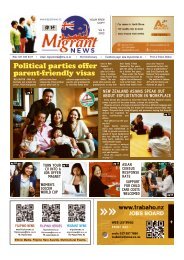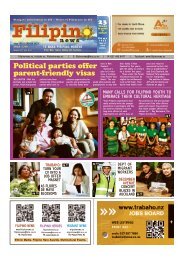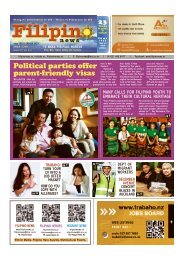Create successful ePaper yourself
Turn your PDF publications into a flip-book with our unique Google optimized e-Paper software.
P a g e 1 2 w e b s i t e : w w w . m i g r a n t n e w s . n z I w w w . f a c e b o o k . c o m / w w w . m i g r a n t n e w s . n z I TWITTER : www.twittercom/migrantnews<br />
When do I need to get tested?<br />
When do I need to get<br />
tested?<br />
• You only need to get tested<br />
if you have symptoms or<br />
you live with someone who<br />
has tested positive for<br />
COVID-19.<br />
• If you’re a close contact<br />
outside the household (e.g.<br />
from work), you should<br />
monitor yourself for symptoms.<br />
You don’t need to get<br />
tested or isolate unless you<br />
develop symptoms.<br />
Where do I get a rapid<br />
antigen test (RAT)? And<br />
how do I do a RAT?<br />
People who have symptoms<br />
of COVID-19 or live<br />
with someone who has tested<br />
positive for the virus can<br />
get RAT tests from either a<br />
nearby community testing<br />
centre, or order them online<br />
at https://requestrats.<br />
covid19.health.nz/ and then<br />
pick them up from a nearby<br />
collection site.<br />
If you’re not comfortable<br />
doing a RAT at home by<br />
yourself, you can get a<br />
supervised RAT from your<br />
general practice or urgent<br />
care clinic. You can contact<br />
your general practice to<br />
arrange this.<br />
There are currently 11 different<br />
brands of RAT tests<br />
available in New Zealand, so<br />
you will need to follow the<br />
instructions on the packet<br />
you receive.<br />
How do I RAT test my<br />
young child?<br />
1. Take it easy and slow.<br />
Don’t rush. Explain the<br />
process to the child.<br />
2. Begin by blowing their<br />
nose – young children find it<br />
hard to blow their own nose.<br />
3. Rest their head on a<br />
chair with a headrest or pillow<br />
on a couch. For younger<br />
children, sit them on your<br />
lap with their head resting in<br />
your elbow fold.<br />
4. Aim down and back<br />
rather than up high to reduce<br />
pain and increase test accuracy.<br />
5. Afterwards, congratulate<br />
your child on a job well<br />
done. Older children will be<br />
able to graduate to doing it<br />
themselves.<br />
<strong>No</strong>te: RATs are not recommended<br />
for children under 2<br />
years old.<br />
How do I record my<br />
RAT test result?<br />
You will need to record<br />
your result at mycovid<br />
record.nz or call 0800 222<br />
478.<br />
Currently, only people<br />
above the age of 12 can<br />
report through My Covid<br />
Record, while parents and<br />
caregivers are asked to<br />
report young children's positive<br />
results by calling 0800<br />
222 478.<br />
If you get your RAT test<br />
done by your GP or at an<br />
urgent care clinic, they will<br />
record your result for you.<br />
It’s important to record your<br />
result so that the health team<br />
can assess whether you<br />
might need additional support.<br />
What if I don’t want to<br />
do a RAT at home?<br />
If you don’t feel comfortable<br />
doing a RAT by yourself<br />
at home, you can also<br />
contact your GP or nearest<br />
urgent care clinic to arrange<br />
a supervised RAT test<br />
instead. It’s best to call<br />
ahead rather than walk in.<br />
They will record the result<br />
Dr Gary Wu, who is a<br />
vaccinating Auckland GP at<br />
The Doctors New Lynn has<br />
contributed to responding to<br />
the following questions,<br />
alongside the <strong>No</strong>rthern<br />
Region Health Coordination<br />
Centre (NRHCC) which is<br />
running Auckland’s<br />
vaccination programme.<br />
for you.<br />
What do I do if I or<br />
someone in my household<br />
tests positive for COVID-<br />
19?<br />
• If someone in your<br />
household tests positive for<br />
COVID-19, the entire<br />
household will need to isolate<br />
at home.<br />
• Most people who get<br />
COVID-19 will be able to<br />
safely isolate and recover at<br />
home with help from friends<br />
and whanau.<br />
• If you start to feel worse,<br />
please stay at home and call<br />
your GP or Healthline on<br />
0800 358 5453. All GP and<br />
urgent care clinic appointments<br />
for COVID-19 are<br />
free.<br />
• If you or a family member<br />
becomes very unwell,<br />
like having difficulty breathing<br />
or chest pains, call 111<br />
immediately. The ambulance<br />
will be free.<br />
If you live by yourself,<br />
arrange for a family member<br />
or friend to call to check in<br />
on you each day.<br />
How can I best prepare<br />
my family/household for<br />
one or more of us to get<br />
COVID-19?<br />
• If it’s been at least three<br />
months since you had your<br />
second dose, consider getting<br />
your booster as soon as<br />
possible. Being vaccinated,<br />
including having your booster<br />
dose, is the most important<br />
thing you can do to help<br />
increase your protection<br />
from Omicron.<br />
• If you have children aged<br />
5 to 11-years-old, you can<br />
help keep them safe and protect<br />
your family by getting<br />
them immunised now<br />
against COVID-19. Just turn<br />
up at a drive-through vaccination<br />
centre or walk-in to<br />
get your vaccinations.<br />
• Make a plan to prepare<br />
for home isolation in case<br />
you or someone in your<br />
household has to isolate, this<br />
includes:<br />
• Think about who might<br />
be able to help with any caring<br />
if you’re not available –<br />
for example caring for elderly<br />
relatives.<br />
• Try to have extra food in<br />
the house.<br />
• Medical supplies – e.g.<br />
masks, paracetamol, ibuprofen,<br />
throat lozenges, nasal<br />
spray, cough medicine, ice<br />
pack, a thermometer, prescription<br />
medicine.<br />
• Cleaning supplies – e.g.<br />
disinfectant, bleach, rubbish<br />
bags.<br />
• Hygiene supplies – e.g.<br />
hand sanitiser, gloves, toilet<br />
paper, tampons or pads, nappies,<br />
tissues.<br />
• Things you enjoy doing<br />
– e.g. books, crosswords,<br />
games, devices, movies.<br />
• Reach out to others in the<br />
community to offer your<br />
support, particularly people<br />
who are elderly or living<br />
alone. You might be able to<br />
help out by dropping off groceries<br />
outside their door or<br />
calling them each to check<br />
in.<br />
For more on how to prepare,<br />
visit Unite against<br />
Covid19 - prepare and stay<br />
safe.<br />
Why is getting a booster<br />
so important with Omicron?<br />
If you are vaccinated and<br />
boosted you are likely to<br />
only have a mild illness and<br />
recover in a few days, and<br />
some people will have no<br />
symptoms at all.<br />
While two doses provide<br />
some degree of protection<br />
against severe disease from<br />
Omicron, a booster is likely<br />
to offer greater protection<br />
against transmitting<br />
COVID-19 to others and<br />
reduce the chance of more<br />
serious infections. It also<br />
means reducing hospitalisations<br />
and putting less pressure<br />
on our health system.<br />
The Asia-Pacific Food Channel : 027 495 8477<br />
• Taste Test: Best supermarket Hot Cross Buns<br />
• PH potato snack giant set to corner market<br />
• Luntian - Filipino food with a Vegan Twist<br />
• <strong>No</strong>stalgia for Homecooked food drives expansion<br />
• Boodle Fight: All hands on deck kababayan!<br />
• Modern twist to traditional Filipino cuisine<br />
• Why not feature your restaurant at halohalo.nz?

















